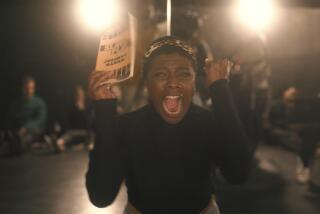Students Hear Slave’s Story : Inspiration Found in Woman’s Struggle Against Oppression
- Share via
SANTA ANA — Harriet A. Jacobs, a runaway slave, edged her way along the cramped attic where she would hide for seven agonizing years and found a nail sharp enough to scrape a pin-sized hole through a wall. Peeking about anxiously, she caught a glimpse of her two children, who had no idea their mother was still about.
“When I saw them, I wanted to cry out ‘Children, I am heeere!” she would later write in her diary. “But I knew I couldn’t.”
Instead of bemoaning her fate, however, she exulted. “Yet another triumph,” she wrote.
Jacobs’ true story had its setting in the early 19th century. But it was brought to life again Thursday for a group of eighth-graders at MacArthur Fundamental Intermediate School, serving as a modern-day lesson in the importance of maintaining self-esteem and a strong will in the face of oppressive forces.
To commemorate Black History Month, actress Tamiko Washington has taken the critically acclaimed play, “Incidents in the Life of a Slave Girl,” to four Orange County schools. The one-woman drama, based on Jacobs’ memoirs, tells the story of a headstrong woman who resisted her lot as a slave and eventually escaped after seven years of hiding in her grandmother’s attic. During that time, only rats and the occasional voice below kept her company.
Throughout the hourlong performance, Washington emphasizes that Jacobs chose her own prison and triumphed over seemingly insurmountable odds.
“She kept her dignity,” she told her young audience after the performance. “If she could do it, anyone today should be able to have enough conviction to face whatever comes their way.”
“I can’t believe she really went through that,” said Sam Waldram, 14. “People went through worse things back then. Today, we are still fighting people who want to control us, but it’s not that bad.”
Added another 14-year-old: “My cousin should see this. She lost three babies and is always crying. This would show her that she needs the will to carry on.”
Three of the seven Orange County schools originally scheduled to host Washington’s performances canceled when school leaders learned that the play’s dialogue contained oblique references to a slave owner’s verbal sexual harassment of Jacobs. All three were elementary schools.
“This play is just too much for our kids,” said Clay White, principal at El Toro Marine Elementary School.
“It was strictly a judgment call,” said Beverly Khalil, principal of Irvine’s Westwood Basics One. “Elementary students shouldn’t be exposed to that.”
*
Lorna Shelby, a counselor at MacArthur Fundamental who actively sought to have the drama staged at her school, said exposure to parts of the performance is what students need.
Others “want people to forget these things exist,” she said. “The overall message is more important. Kids need to know what happened in the past.”
Said Washington: “I don’t think they read the script we sent them.”
The references that made schools nervous, she said, were merely a 15-year-old Jacobs’ timid accounts of repeated sexual innuendo by “Dr. Flint,” her owner.
“He peopled my young mind with unclean images . . . ,” Washington said during Thursday’s performance.
What disturbed the eighth-grade audience at MacArthur more was Washington’s vivid reenactment of Dr. Flint beating an older Jacobs and her children.
Wailing and screeching in the small school auditorium as she pretended that her arm was being wrenched by her fierce owner, Washington elicited uncomfortable flinches from the young audience.
“Something like this gives you more willpower,” said 13-year-old Nydia Villa. “She went through a lot more than we go through now.”
More to Read
The biggest entertainment stories
Get our big stories about Hollywood, film, television, music, arts, culture and more right in your inbox as soon as they publish.
You may occasionally receive promotional content from the Los Angeles Times.










